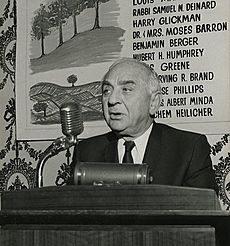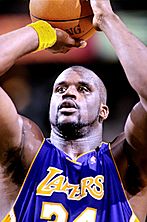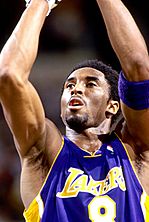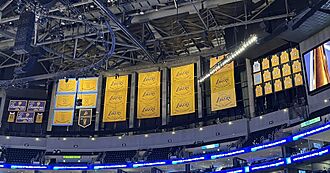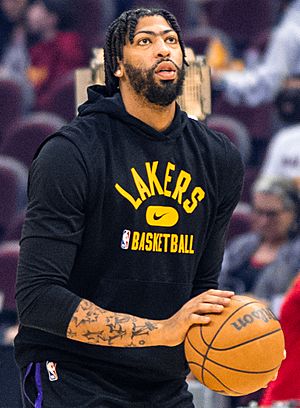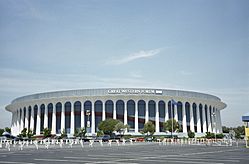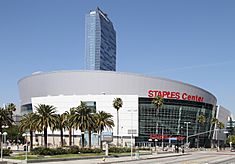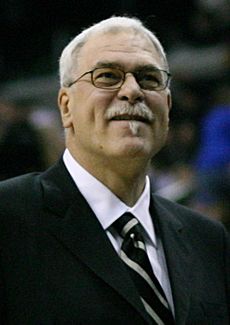Los Angeles Lakers facts for kids
Quick facts for kids Los Angeles Lakers |
|||
|---|---|---|---|
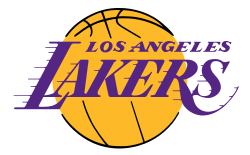 |
|||
| Conference | Western | ||
| Division | Pacific | ||
| Founded | 1946 | ||
| History | Detroit Gems 1946–1947 (NBL) Minneapolis Lakers 1947–1948 (NBL) 1948–1949 (BAA) 1949–1960 (NBA) Los Angeles Lakers 1960–present |
||
| Arena | Crypto.com Arena | ||
| Location | Los Angeles, California | ||
| Team colors | Purple, gold, black |
||
| Main sponsor | Bibigo | ||
| President | Rob Pelinka | ||
| General manager | Rob Pelinka | ||
| Head coach | JJ Redick | ||
| Ownership | Mark Walter (majority) Jeanie Buss (governor) Buss Family Trusts, Todd Boehly, Edward P. Roski, and Patrick Soon-Shiong (minority) |
||
| Affiliation(s) | South Bay Lakers | ||
| Championships | 18 NBL: 1 (1948) BAA/NBA: 17 (1949, 1950, 1952, 1953, 1954, 1972, 1980, 1982, 1985, 1987, 1988, 2000, 2001, 2002, 2009, 2010, 2020) |
||
| Conference titles | 19 (1972, 1973, 1980, 1982, 1983, 1984, 1985, 1987, 1988, 1989, 1991, 2000, 2001, 2002, 2004, 2008, 2009, 2010, 2020) | ||
| NBA Cup titles | 1 (2023) | ||
| Division titles | 35 NBL: 1 (1948) NBA: 34 (1950, 1951, 1953, 1954, 1962, 1963, 1965, 1966, 1969, 1971, 1972, 1973, 1974, 1977, 1980, 1982, 1983, 1984, 1985, 1986, 1987, 1988, 1989, 1990, 2000, 2001, 2004, 2008, 2009, 2010, 2011, 2012, 2020, 2025) |
||
| Retired numbers | 14 (8, 13, 16, 21, 22, 24, 25, 32, 33, 34, 42, 44, 52, 99) | ||
|
|||
The Los Angeles Lakers are a professional basketball team based in Los Angeles, California. They play in the National Basketball Association (NBA) as part of the Western Conference. The Lakers play their home games at Crypto.com Arena, which they share with other sports teams like the Los Angeles Sparks (WNBA) and the Los Angeles Kings (NHL). The Lakers are one of the most successful teams in NBA history, having won 17 championships. This is the second-highest number of championships in the league, just behind the Boston Celtics.
The team started in 1946 as the Detroit Gems in the National Basketball League (NBL). After one season, the team moved to Minneapolis, Minnesota, and became the Minneapolis Lakers. They won the 1948 NBL championship. Then, they joined the Basketball Association of America (BAA) and won the 1949 BAA championship. When the NBL and BAA merged to form the NBA in 1949, the Lakers won four more NBA championships in the next five years. Because of money problems in the late 1950s, the team moved to Los Angeles before the 1960–61 season.
The Lakers reached the NBA Finals six times in the 1960s. However, they lost each time to the Celtics, which started their famous rivalry. In 1968, the Lakers got Wilt Chamberlain, a four-time NBA MVP. They won their sixth NBA title in 1972, led by coach Bill Sharman. After Chamberlain retired, the team traded for superstar Kareem Abdul-Jabbar. In 1979, two big things happened: Jerry Buss bought the Lakers, and they drafted Magic Johnson first overall. Johnson, a talented point guard, and Abdul-Jabbar, a dominant center, became the team's main stars. With coach Pat Riley joining in 1981 and James Worthy drafted in 1982, the Lakers became a powerhouse in the 1980s. They won five championships in nine years, including two big Finals wins against the Celtics. The Lakers lost to Boston in the 1984 Finals, but they beat them in 1985 and 1987.
After Riley left and Abdul-Jabbar, Johnson, and Worthy retired, the Lakers struggled in the early 1990s. In 1996, the team traded for Kobe Bryant and signed Shaquille O'Neal. This brought the Lakers back to dominance in the early 2000s. This superstar duo, along with Hall of Fame coach Phil Jackson, led the Lakers to three championships in a row from 2000 to 2002. This was the franchise's second "three-peat" (winning three titles in a row). The "Shaq-and-Kobe" era ended when O'Neal was traded after the team lost to the Detroit Pistons in the 2004 Finals. Bryant and Jackson returned to the NBA Finals after the Lakers traded for Pau Gasol. They lost to the Celtics in 2008 but won championships in 2009 and 2010. The 2010 Finals was the most recent time the Lakers and Celtics played each other for the championship. Los Angeles won its 16th title.
Jackson retired in 2011, and the Lakers then had their longest period without making the playoffs. Gasol left in 2014, and Bryant retired in 2016. After rebuilding with young players, the Lakers signed superstar LeBron James in 2018. In 2019, the team traded several young players for star big man Anthony Davis. Led by James, Davis, and coach Frank Vogel, the Lakers won their 17th championship in 2020. This tied the Boston Celtics for the most titles until 2024. In February 2025, the Lakers traded Davis and acquired Luka Dončić.
The Lakers hold the record for the NBA's longest winning streak, winning 33 games in a row during the 1971–72 season. Many Hall of Fame players (26) have played for Los Angeles, and four Hall of Fame coaches have led the team. Abdul-Jabbar, Johnson, O'Neal, and Bryant together won eight NBA MVP awards while playing for the Lakers.
Contents
- Team History and Key Eras
- Early Years and Minneapolis Success
- Moving to Los Angeles and the Celtics Rivalry (1958–1968)
- The Wilt Chamberlain Era (1968–1973)
- Building "Showtime" (1973–1979)
- The "Showtime" Era (1979–1991)
- Post-"Showtime" and Rebuilding (1991–1996)
- The O'Neal and Bryant Dynasty (1996–2004)
- The Kobe Bryant Era (2004–2016)
- Post-Bryant Era (2016–2018)
- The LeBron James Era (2018–Present)
- Team Rivalries
- Team Ownership History
- Fanbase and Sponsors
- Team Name, Logo, and Uniforms
- Season-by-Season Records
- Team and NBA Records
- Home Arenas
- Team Personnel
- Head Coaches
- Hall of Famers and Retired Numbers
- Team Media and Broadcasts
- See also
Team History and Key Eras
Early Years and Minneapolis Success
The Lakers team started in 1946 as the Detroit Gems. They played in the NBL for one season, finishing last with only 4 wins in 44 games. The team was losing a lot of money, so its owners sold it to Ben Berger and Morris Chalfen from Minnesota for $15,000.
A Minneapolis sportswriter named Sid Hartman helped make the deal happen. The team was renamed the Lakers, inspired by Minnesota's nickname, "Land of 10,000 Lakes." Hartman also helped them hire John Kundla as their first head coach.
Since the team had the worst record the previous season, they got the first pick in the 1947 draft. They used it to pick George Mikan. With Mikan, forward Jim Pollard, and playmaker Herm Schaefer, the Lakers had a strong team. In their first season, they led the league with a 43–17 record and won the NBL championship.
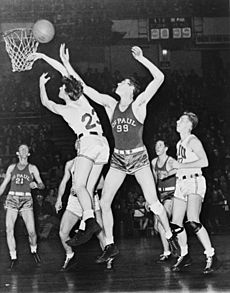
In 1948, the Lakers moved from the NBL to the Basketball Association of America (BAA). Mikan scored 28.3 points per game (ppg), setting a BAA record. In the 1949 BAA Finals, they won the championship, beating the Washington Capitols. After that season, the BAA and NBL merged to form the National Basketball Association (NBA). In the new NBA, the Lakers improved their record to 51–17 and won their third championship in a row. In the 1950–51 season, Mikan won his third scoring title, and the Lakers won their second division title.
During the 1951–52 season, the Lakers won 40 games and finished second in their division. They played the New York Knicks in the NBA Finals and won in seven games. In the 1952–53 season, Mikan led the NBA in rebounding and was named MVP of the 1953 NBA All-Star Game. After a 48–22 regular season, the Lakers beat the Fort Wayne Pistons to reach the NBA Finals. They then defeated the New York Knicks to win their second championship in a row. Even though Mikan had knee problems, he still averaged 18 ppg. Clyde Lovellette also helped the team. The team won its third straight championship in the 1950s and sixth in seven seasons by beating the Syracuse Nationals in seven games.
Moving to Los Angeles and the Celtics Rivalry (1958–1968)
After Mikan retired in 1954, the Lakers struggled but still won 40 games. They made the playoffs but lost in the semifinals. Mikan returned briefly in 1955–56 but retired for good after that season. The Lakers had one of their worst seasons in 1957–58, winning only 19 games.
The Lakers got the top pick in the 1958 NBA draft and chose Elgin Baylor. Baylor was named NBA Rookie of the Year and helped the Lakers improve. They reached the NBA Finals but were swept by the Celtics, which started their long rivalry.
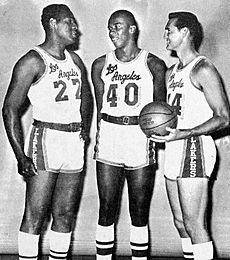
In their last year in Minneapolis, the Lakers had a 25–50 record. In January 1960, their plane crash-landed during a snowstorm, but no one was hurt. Their record earned them the second pick in the 1960 NBA draft, and they chose Jerry West. In the 1960 off-season, the Lakers became the NBA's first West Coast team when owner Bob Short moved the team to Los Angeles. With Baylor scoring 34.8 ppg and 19.8 rebounds per game (rpg), Los Angeles won 11 more games than the year before in West's first season. In November, Baylor set a new NBA scoring record with 71 points against the New York Knicks. Despite a losing record, the Lakers made the playoffs and almost reached the NBA Finals.
Led by Baylor (38.3 ppg) and West (30.8 ppg), the Lakers improved to 54–26 in 1961–62 and made the finals. In a Game 5 victory, Baylor scored 61 points, an NBA Finals record that still stands. However, the Lakers lost to the Celtics in overtime of Game 7. Frank Selvy missed a shot that could have won the game in regulation.
Los Angeles won 53 games in 1962–63 but lost in the NBA Finals to the Celtics in six games. After a tough season in 1963–64, the team won 49 games in 1964–65. They beat the Baltimore Bullets in the division finals, with West scoring a record 46.3 ppg in the series. But they lost to the Celtics in the Finals again.
Los Angeles lost to Boston in the Finals in seven games in 1966. After a poor season in 1966–67, they lost in the finals to the Celtics again in 1968. The Lakers moved to a new arena, The Forum, in 1967, after playing seven seasons at the Los Angeles Memorial Sports Arena.
The Wilt Chamberlain Era (1968–1973)
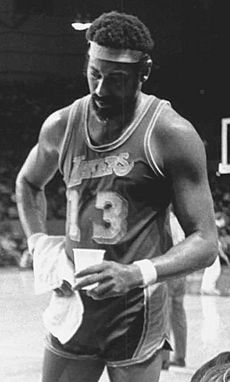
On July 9, 1968, the team got Wilt Chamberlain from the Philadelphia 76ers. In his first season as a Laker, Chamberlain set a team record by averaging 21.1 rpg, leading the league. West, Baylor, and Chamberlain all averaged over 20 points, and Los Angeles won their division. The Lakers and Celtics met in the finals again. Los Angeles had home court advantage for the first time in their rivalry. They won the first game with Jerry West scoring 53 points and led the series 3–2. However, Boston won the series in seven games, earning their 11th NBA Championship. West was named the first-ever Finals MVP, which is still the only time a player from the losing team has won the award. In 1970, West won his first scoring title. The team returned to the finals and played the New York Knicks, who defeated them 4–3. The next season, the Lakers lost to the Milwaukee Bucks, led by future Laker Lew Alcindor (now known as Kareem Abdul-Jabbar).
The 1971–72 season brought many changes. Owner Jack Kent Cooke hired Bill Sharman as head coach, and Elgin Baylor retired early in the season. Sharman made the team more disciplined. He introduced the "shootaround," where players practiced shots early in the morning before games. They won 14 games in a row in November and all 16 games in December. They won three more games in January 1972, but on January 9, the Milwaukee Bucks ended their winning streak. By winning 33 games in a row, Los Angeles set a record for the longest winning streak in major American professional team sports. The Lakers won 69 games that season, which was an NBA record for 24 years until the Chicago Bulls won 72 games in 1995–96. Chamberlain averaged 14.8 points but led the league in rebounding. West led the league in assists per game (apg) and was named MVP of the 1972 NBA All-Star Game. The team scored over 100 points in almost every game, and Bill Sharman was named Coach of the Year. The Lakers reached the finals against the New York Knicks and beat them 4 games to 1. Chamberlain had 24 points and 29 rebounds in Game 5 and won the NBA Finals MVP Award.
The Lakers won 60 games in the 1972–73 season and won another Pacific Division title. Wilt Chamberlain, in his final season, again led the league in rebounding and set an NBA record for field-goal percentage. The team beat the Chicago Bulls and the Golden State Warriors in the playoffs. They played the New York Knicks in the 1973 NBA Finals. Los Angeles won the first game, but New York won the series in five games.
Building "Showtime" (1973–1979)
During the 1973–74 season, the team struggled because West played only 31 games due to injuries. Gail Goodrich helped the team with his scoring. The Lakers made the playoffs but lost to Milwaukee. After the season, West retired.
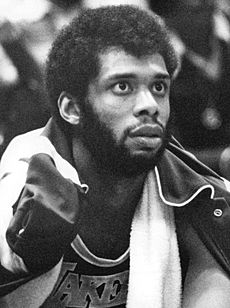
After missing the playoffs in the 1974–75 season, the Lakers got Kareem Abdul-Jabbar, who had already won three league MVP awards. Abdul-Jabbar wanted to leave Milwaukee and was traded to the Lakers. He had his fourth MVP season in 1975–76, leading the league in rebounding and blocked shots. The Lakers finished out of the playoffs.
West was hired to coach the team. With another MVP season from Abdul-Jabbar, Los Angeles won the Pacific Division in 1976–77. They beat the Warriors but were swept by Portland in the Western Conference Finals. The Lakers then got Jamaal Wilkes and signed Norm Nixon.
In the 1977–78 season, Abdul-Jabbar got into a fight and broke his hand. Later, Kermit Washington punched Rudy Tomjanovich, causing serious injuries. Washington was suspended and released. Despite these issues, the team won 45 games but lost in the first round of the playoffs. In the 1978–79 season, the team had a 47–35 record but lost in the semifinals.
The "Showtime" Era (1979–1991)
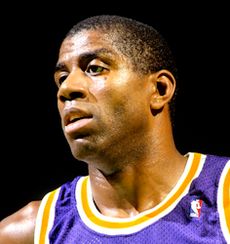
In the 1979 NBA draft, Los Angeles picked Magic Johnson first overall. Johnson's amazing passing skills, especially his "no-look" passes, became a key part of the Lakers' offense. The Lakers won 60 games in Johnson's first year and beat the Philadelphia 76ers in six games in the 1980 NBA Finals. Johnson won the Finals MVP award. The team struggled in the 1980–81 season because Johnson was out with a knee injury. They lost in the first round of the playoffs.
Early in the 1981–82 season, Johnson complained about head coach Paul Westhead, who was then fired. Owner Jerry Buss promoted assistant coach Pat Riley. The team became known as "Showtime" because of their fast-paced offense led by Johnson. The Lakers won their division and swept their first two playoff series. They won the NBA Finals 4–2 against the 76ers. In the 1982 draft, the Lakers picked James Worthy first overall. The Lakers won their division, but Worthy got injured and missed the rest of the season. They reached the 1983 NBA Finals but lost to Philadelphia in four games.
In the 1983–84 season, Los Angeles played Boston in the Finals for the first time since 1969. The Lakers won two of the first three games. However, a hard foul by Kevin McHale on Kurt Rambis was a turning point. Boston won three of the next four games to win the title.
Using that loss as motivation, the team won their division for the fourth straight year in 1984–85. In the NBA Finals, the Celtics were again the Lakers' opponent. Los Angeles lost Game 1 badly. But the Lakers, led by 38-year-old Finals MVP Abdul-Jabbar, came back to beat the Celtics in six games. They won the title in the Boston Garden, becoming the first visiting team to win an NBA championship there.
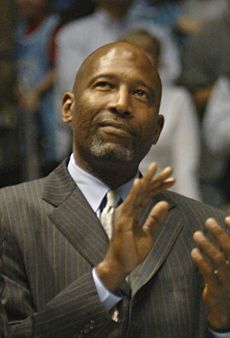
In the 1985–86 season, the Lakers started strong and won 62 games. However, the Rockets beat the Lakers in five games in the Western Conference Finals.
Before the 1986–87 season, the Lakers added A.C. Green and Mychal Thompson. Johnson won his first MVP Award, leading the Lakers to a 65–17 record. Michael Cooper was named NBA Defensive Player of the Year. The Lakers swept the Nuggets and SuperSonics and beat the Warriors to reach the NBA Finals. They defeated Boston in six games, winning their second championship in three seasons. Johnson was named NBA Finals MVP. Coach Riley famously declared that Los Angeles would win again the next year.
In the 1987–88 season, the Lakers won their seventh straight division title with a 62–20 record. They had tough seven-game series wins over the Utah Jazz and the Dallas Mavericks. This led them to the NBA Finals again, where they met the Detroit Pistons. Los Angeles won the series in seven games, and James Worthy's triple-double in Game 7 earned him a Finals MVP award. This was their fifth title in nine years, but also their last until 2000.
In the 1988–89 season, Los Angeles won 57 games and their eighth straight division title. They swept through the playoffs but faced the Detroit Pistons again in the NBA Finals. With injuries to Byron Scott and Johnson, the Lakers were swept by Detroit.
After the 1989 Finals, Kareem Abdul-Jabbar retired. The Lakers still won their ninth straight division title with a 63–19 record. However, they lost to the Suns in the second round of the playoffs. Coach Riley stepped down, and Mike Dunleavy replaced him.
The 1990–91 Lakers did not win their division for the first time in 10 years, but still had a 58–24 record. After a strong run in the Western Conference playoffs, the Lakers reached the NBA Finals again. However, they were defeated in five games by the Chicago Bulls, led by superstar Michael Jordan. This marked a change in the league.
Post-"Showtime" and Rebuilding (1991–1996)
The Lakers started the 1991–92 season by winning a tournament in Paris. But on November 7, 1991, Magic Johnson announced he had tested positive for HIV and would retire immediately.
In their first season without Johnson, the team won 43 games and made the playoffs but lost in the first round. Coach Mike Dunleavy was fired.
The Lakers had a losing record in 1992–93 under Randy Pfund. They still made the playoffs and took a 2–0 lead against the top-seeded Phoenix team, but lost the series. In the 1993–94 season, Pfund was fired, and the Lakers missed the playoffs for the first time since 1976. Magic Johnson coached the final 16 games but decided not to stay as coach.
Under new coach Del Harris, Los Angeles made the playoffs for the next two seasons but lost early. The team was led by young guards Nick Van Exel and Eddie Jones. Johnson came out of retirement to play again in the 1995–96 season. After some disagreements and a first-round loss, Johnson retired for the final time.
The O'Neal and Bryant Dynasty (1996–2004)
In 1996, the Lakers got 17-year-old Kobe Bryant in a trade and signed free-agent Shaquille O'Neal. They also drafted Derek Fisher. During the season, they traded for Robert Horry. O'Neal led the team to a 56–26 record. The Lakers beat the Portland Trail Blazers in the first round of the playoffs, with O'Neal scoring 46 points in Game 1. But they lost to the Utah Jazz in the next round.
In the 1997–98 season, O'Neal and the Lakers had their best start ever, winning 11 games in a row. Los Angeles finished 61–21. The Lakers beat Portland and Seattle in the playoffs but were swept by the Jazz in the Western Conference Finals.
During the 1998–99 season, All-Star guard Eddie Jones was traded. Coach Del Harris was fired and replaced by Kurt Rambis. The team finished 31–19 in the short season. The Lakers beat Houston in the first round but were swept by San Antonio in the next round. Game 4 of that series was the last game played at The Great Western Forum.
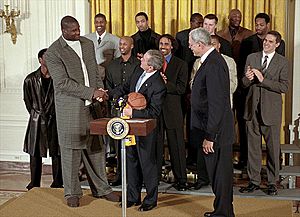
Before the 1999–2000 season, Los Angeles hired former Chicago Bulls coach Phil Jackson, who had won six championships. He brought his "triangle offense" system. The Lakers signed veterans like Brian Shaw and Ron Harper. The team also moved to a new arena, the Staples Center.
Led by league MVP O'Neal, the Lakers won 31 of their first 36 games and finished 67–15. They eliminated Sacramento and Phoenix in the first two playoff rounds. In the Western Conference Finals against Portland, the Lakers came back from a 15-point deficit in the fourth quarter of Game 7 to win. In their first trip to the Finals since 1991, the Lakers defeated the Indiana Pacers to win their first title since 1988.
The next season, the Lakers won fewer regular season games but swept the first three rounds of the playoffs. They met Allen Iverson and the Philadelphia 76ers in the NBA Finals. The Sixers won Game 1, but the Lakers won the next four games to win their second straight title. Their 15–1 playoff record was the best in NBA history at the time.
The Lakers won 58 games in 2001–02. In the playoffs, they swept Portland and beat San Antonio to reach the Western Conference Finals against Sacramento. This series is known as one of the greatest playoff matchups ever. The Lakers won in seven games, with a famous game-winning shot by Robert Horry in Game 4. The Lakers then achieved a "three-peat" by sweeping the New Jersey Nets in the NBA Finals. O'Neal won each of the Finals MVP awards, becoming the only player besides Michael Jordan to win three in a row.
The Lakers tried for a four-peat the next year. They started slowly but finished strong. They beat Minnesota in the first round of the playoffs, but their four-peat attempt ended when they lost to San Antonio in six games.
During the 2003–04 season, the team got a lot of media attention because of its four stars. The Lakers signed two-time MVP Karl Malone and Defensive Player of the Year Gary Payton to join O'Neal and Bryant. This created a "superteam". However, three of the four stars had injuries. The Lakers finished 56–26 and won their division. They beat Houston, San Antonio, and Minnesota to reach the NBA Finals. In the Finals, they lost to Detroit in five games.
The Kobe Bryant Era (2004–2016)
Rebuilding the Team (2004–2007)
In 2004, the team started rebuilding. O'Neal was traded to the Miami Heat for Lamar Odom, Brian Grant, Caron Butler, and a draft pick. Bryant and O'Neal had argued in the past, which was a reason for the trade. Phil Jackson did not return as coach.
The Lakers also traded Rick Fox and Gary Payton to Boston. Derek Fisher left and signed with the Warriors. The team hired Rudy Tomjanovich to replace Jackson. After sitting out the first half of the 2004–05 season, Malone retired. Tomjanovich coached for a while before resigning due to health problems. The Lakers finished 34–48, missing the playoffs for the first time since 1994.
In the 2005 NBA draft, the Lakers picked Andrew Bynum. They also traded for Kwame Brown. Jackson returned to coach the team. On January 22, 2006, Bryant scored 81 points against Toronto, the second-highest total in NBA history. The team finished 45–37 and made the playoffs. They led their first-round series 3–1, but Phoenix came back to win in seven games.
In the next season, the Lakers started well but struggled later, finishing 42–40. They were eliminated in the first round by Phoenix again. Bryant was frustrated and asked to be traded, but the team worked to change his mind.
Bryant and Gasol Win Championships (2007–2011)
After getting Derek Fisher back, the Lakers started the 2007–08 season well. Their center, Andrew Bynum, got injured in January. In a key move, they acquired six-time All-Star Pau Gasol from the Memphis Grizzlies in February. The Lakers finished with a 57–25 record, earning the top spot in the Western Conference. Bryant won the league's MVP award, the first Laker to do so since O'Neal in 2000. In the playoffs, they beat the Nuggets, Jazz, and Spurs, but lost to the Celtics in six games in the NBA Finals.
In the 2008–09 season, the Lakers finished 65–17, the best record in the Western Conference. They beat the Jazz, Rockets, and Nuggets to win the Western Conference title. They then won their 15th NBA championship by defeating the Orlando Magic in five games in the NBA finals. Bryant was named the NBA Finals MVP for the first time.
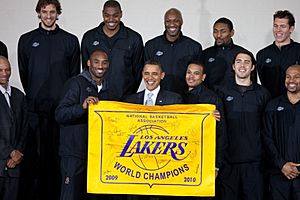
The Lakers, with Ron Artest (Metta World Peace) joining the starting lineup, finished the 2009–10 season with the best record in the Western Conference for the third straight time. In January 2010, the Lakers became the first NBA team to win 3,000 regular-season games. They beat the Oklahoma City Thunder, Utah Jazz, and Phoenix Suns in the Western Conference playoffs. In the finals, the Lakers played the Boston Celtics for the 12th time. They came back from being down 3–2 in the series and erased a 13-point deficit in the fourth quarter of Game 7 to beat the Celtics. This win gave them their 16th NBA title. Bryant was named Finals MVP for the second year in a row.
After much talk, Phil Jackson returned for the 2010–11 season. In the playoffs, the Lakers beat the New Orleans Hornets. But their chance for a three-peat was stopped by the Dallas Mavericks, who swept them in the second round. After the season, Jackson announced he would not return as coach.
Post-Jackson Era and Bryant's Retirement (2011–2016)
After Jackson retired, Mike Brown was hired as head coach in May 2011. Before the 2011–12 season, the Lakers traded Lamar Odom. They also traded Derek Fisher for Jordan Hill. With a 41–25 record, the Lakers made the playoffs as the third seed. They beat the Denver Nuggets but lost to the Oklahoma City Thunder.
In July 2012, Steve Nash joined the Lakers in a trade. In August 2012, the Lakers traded Andrew Bynum and got Dwight Howard. These moves, along with Bryant and Gasol, made people call them a "superteam." On November 9, 2012, Mike Brown was fired after a 1–4 start. Assistant coach Bernie Bickerstaff took over temporarily. On November 12, 2012, the Lakers hired Mike D'Antoni as head coach. On February 18, 2013, Lakers owner Jerry Buss passed away. D'Antoni coached the Lakers to a 40–32 record for the rest of the season, finishing 45–37. The Lakers made the playoffs on the last game of the season. Bryant suffered a serious Achilles tendon injury that ended his season. Without Bryant, the Lakers were swept by the San Antonio Spurs in the first round of the 2013 NBA playoffs.
On December 8, 2013, Bryant returned to play but suffered another knee injury soon after, ending his season. The Lakers missed the NBA playoffs for the first time since 2005. On April 30, 2014, Mike D'Antoni resigned as head coach.
After a long search, the Lakers named former player Byron Scott as the new head coach in July 2014.
During the first game of the 2014–15 season, rookie Julius Randle broke his leg, ending his season. Kobe Bryant also tore a rotator cuff, ending his season after only 35 games. The Lakers finished with a 21–61 record, their worst in franchise history at the time.
The next season, the Lakers picked D'Angelo Russell second overall in the 2015 NBA draft. They also selected Larry Nance Jr.. On November 30, 2015, Bryant announced he would retire at the end of the season after 20 seasons. In Bryant's last season, the team missed the playoffs for the third straight year with a 17–65 record, which was their worst ever.
Post-Bryant Era (2016–2018)
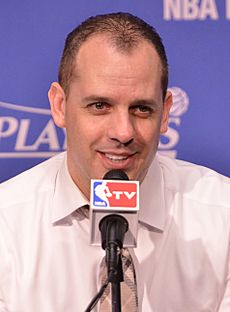
On April 24, 2016, the Lakers decided not to keep Byron Scott as coach. On April 29, another former Laker, Luke Walton, was named their new head coach. The Lakers got the second pick in the 2016 NBA draft and selected Brandon Ingram.
On February 21, 2017, the Lakers fired general manager Mitch Kupchak, and Magic Johnson became the president of basketball operations. Jeanie Buss, the team's governor, also removed her brother, Jim Buss, from his role. On March 7, 2017, the Lakers hired Rob Pelinka as the general manager. The Lakers again got the second pick in the 2017 NBA draft and selected Lonzo Ball. They also acquired Kyle Kuzma and Brook Lopez in a trade. In February 2018, Nance Jr. and Clarkson were traded to the Cleveland Cavaliers.
The LeBron James Era (2018–Present)
James and Davis Era (2019–2025)
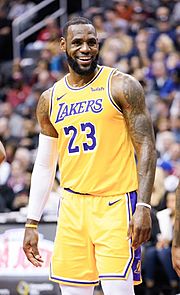
On July 9, 2018, the Lakers signed LeBron James. By Christmas 2018, the Lakers were playing well, but James got injured. Ball and Ingram also ended their seasons early due to injuries. On April 9, 2019, Magic Johnson stepped down from his role, and two days later, the Lakers parted ways with head coach Walton.
On May 13, Frank Vogel was named the Lakers' head coach. On July 6, the Lakers acquired Anthony Davis from the New Orleans Pelicans in a big trade. This trade meant that most of the young players from the rebuilding era were gone, with only Kuzma remaining.
On January 25, 2020, LeBron James passed Kobe Bryant to become third on the NBA's all-time scoring list. The next day, tragedy struck when Bryant was killed in a helicopter accident, along with his daughter Gianna and seven others. The team postponed their next game and paid tribute to Bryant.
After the NBA season was paused in March 2020, the Lakers were invited to the NBA Bubble to finish the season. The Lakers ended the regular season with a 52–19 record, making the playoffs for the first time since 2013 and as the top seed since 2010. They reached the NBA Finals for the first time since 2010. They defeated the Miami Heat 4–2 to win the 2020 NBA Finals. James was named the Finals MVP. This championship was dedicated to Bryant and gave Los Angeles their 17th title, tying the Boston Celtics for the most all-time. Jeanie Buss became the first female owner of an NBA team to win the NBA Finals.
In 2021, the Lakers added many veteran players, including Russell Westbrook in a big trade. Kyle Kuzma, the last player from the young core era, was traded away. Other veterans like Carmelo Anthony and Dwight Howard joined the team.
The Lakers made a surprising run in the 2023 Playoffs, reaching the Western Conference Finals, but lost to the Denver Nuggets.
On December 9, 2023, the Lakers won the first-ever NBA In-Season Tournament by defeating the Indiana Pacers. James was named the tournament MVP. They finished the 2023–24 season 47–35 and made the playoffs as the seventh seed.
On June 20, 2024, JJ Redick was hired as the Lakers' head coach.
On June 27, 2024, the Lakers drafted Bronny James, LeBron's son, making them the first father-son duo in NBA history. On October 23, 2024, they played together in a game against the Minnesota Timberwolves.
The Luka Dončić Era (2025–Present)
On February 1, 2025, the Lakers traded Anthony Davis and other players for All-Star guard Luka Dončić, Maxi Kleber, and Markieff Morris.
Team Rivalries
Boston Celtics
The rivalry between the Boston Celtics and the Lakers is one of the most famous in basketball. These two teams have met a record 12 times in the NBA Finals. They were the top teams in the 1960s and 1980s, playing each other for the championship six times in the 60s and three times in the 80s.
The rivalry became less intense after Magic Johnson and Larry Bird retired in the early 1990s. However, it was renewed in 2008 when the Celtics and Lakers met in the Finals for the first time since 1987. The Celtics won that series. They faced off again in the 2010 NBA Finals, which the Lakers won in 7 games.
The two teams were tied with 17 championships each until the Celtics won their 18th title in 2024. Together, their 35 championships make up almost half of all NBA championships ever.
The Celtics have a winning record against the Lakers in all games played. Boston is the only NBA team with an overall winning record against the Lakers.
Detroit Pistons
The rivalry between the Lakers and the Detroit Pistons grew in the late 1980s. Both teams played each other in back-to-back Finals in 1988 (Lakers won) and 1989 (Pistons won).
The rivalry became strong again in the early 2000s when they met in the 2004 NBA Finals, which the Pistons won.
Golden State Warriors
The Lakers and the Golden State Warriors have a long history, as both teams moved to California in the early 1960s. While they are geographically close, there is more respect than strong dislike between them. The rivalry grew in the 1970s and became even more exciting when LeBron James joined the Lakers, as he had faced the Warriors in four straight Finals with his previous team. The two teams have met seven times in the playoffs. The Lakers lead the all-time regular season series and playoff series against the Warriors.
Los Angeles Clippers
The rivalry between the Lakers and the Los Angeles Clippers is special because they used to share the same arena, the Crypto.com Arena. It's one of only two rivalries where teams are in the same city (the other being the New York Knicks and Brooklyn Nets).
Historically, Lakers fans have been more numerous in Los Angeles. Some people say it wasn't a true rivalry until the Clippers became more successful.
Phoenix Suns
The Lakers and the Phoenix Suns rivalry became more intense in the 2000s when the teams were led by Kobe Bryant and Steve Nash.
San Antonio Spurs
The San Antonio Spurs and the Lakers developed a rivalry in the late 1990s and early 2000s. Since 1999, they have met in the NBA Playoffs five times. From 1999 to 2005, these two clubs combined to appear in seven straight NBA Finals. They also won five NBA championships between 1999 and 2003. From 1999 to 2004, their matchups were often seen as the top rivalry in the NBA. Each time they met in the playoffs, the winner went on to the NBA Finals. They met again in the Western Conference Finals in 2008, where the Spurs lost, but the Spurs beat the Lakers when they met again in 2013.
Sacramento Kings
The Kings and the Lakers have played each other in the playoffs nine times between 1949 and 2002. Since the Kings moved to Sacramento in 1985, both teams have been based in California. The 2002 Western Conference Finals was a very competitive series, with many controversial calls in Game 6. The Lakers eventually won the series in Game 7.
Team Ownership History
Early Owners and the Move to LA
The Detroit Gems were founded in 1946. Later, Ben Berger and Morris Chalfen bought the team for $15,000, moved it to Minnesota, and renamed it the Lakers. General manager Max Winter also owned a part of the team. After George Mikan retired, attendance dropped, and the team lost money.
In 1957, the Lakers were sold to a group of investors led by Bob Short. Short eventually owned 80% of the team, but the team was still struggling financially. The NBA even put the Lakers on "financial probation." Short was forced to move the team to Los Angeles in 1960. The NBA owners first voted against the move, but changed their minds when Short suggested he might join a new rival league. With Baylor's popularity and the new location, the team's finances improved in Los Angeles.
Short sold the team to Washington Redskins owner Jack Kent Cooke in 1965 for $5.175 million, a record amount at the time. Cooke was a very involved owner and built The Forum arena in 1967.
The Buss Family Takes Over
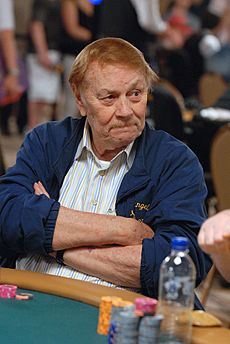
In 1979, Cooke sold the Lakers, the NHL's Los Angeles Kings, The Forum, and some real estate to real estate investor Jerry Buss for $67.5 million. When Buss bought the team, the Lakers had only won one title since moving to Los Angeles. During Buss' 33 years as owner, the Lakers won ten NBA championships and reached the conference finals 16 times. He was elected to the Basketball Hall of Fame in 2010. When he passed away in 2013, Forbes valued the team at $1 billion.
Jeanie Buss has been the Lakers' main owner since 2013. She runs the team for the entire Buss family. Jerry Buss' six children own 66% of the team through family trusts. These trusts make sure the family keeps control of the team. In February 2017, Jeanie fired her brother Jim from his role, which led to a legal dispute over who controlled the team. The dispute was resolved in Jeanie's favor, giving her control over the team for life, as long as the family owns it. In October 2024, Forbes estimated the Lakers were the third-most-valuable team in basketball, worth $7.1 billion.
As of 2024, the Lakers are owned by the Buss Family Trusts (66%), Mark Walter (20%), Todd Boehly (7%), Patrick Soon-Shiong (4%), and Ed Roski Jr. (3%).
- In 1994, Buss sold a small part of the team to Magic Johnson.
- In 1998, Buss sold a 25% share to Philip Anschutz and Ed Roski Jr.
- In 2010, Johnson sold his shares to Patrick Soon-Shiong.
- In 2021, Anschutz sold his shares to Los Angeles Dodgers co-owners Mark Walter and Todd Boehly.
Mark Walter Becomes Majority Owner
In June 2025, it was reported that the Buss family agreed to sell majority control of the team to Mark Walter. As part of the deal, Walter agreed that Jeanie Buss would continue to run the team for several years. The Buss family will keep a 15% share of the team for a while.
Fanbase and Sponsors
Jerry Buss started the trend of allowing sponsors to name stadiums when he renamed The Forum the Great Western Forum in 1988. From 2002 to 2007, the team averaged over 18,900 fans, making them one of the top teams in NBA attendance. In 2008, every home game was sold out. In 2010, the Lakers had the most popular team merchandise in the NBA, and Kobe Bryant had the most popular jersey. In 2009, major sponsors included Verizon Wireless, Toyota, and American Express. The team's average ticket price was the highest in the league.
The Lakers have a jersey patch deal with Bibigo that started in the 2021-22 season. Other major sponsors include American Express, Chevron, Nike, and MGM Resorts. The Lakers sold over 767,000 tickets for the 2024-25 season.
Because the team is close to Hollywood, many celebrities are Lakers fans and can often be seen at the Crypto.com Arena during home games. Jack Nicholson has had season tickets since the 1970s. The band Red Hot Chili Peppers even wrote a song called "Magic Johnson" in tribute to the former point guard.
Team Name, Logo, and Uniforms
The nickname "Laker" comes from Minnesota being the "Land of 10,000 Lakes." The team's colors are purple, gold, and white. The Lakers logo shows the team name, "Los Angeles Lakers," written in purple on a gold basketball. The team usually wears white jerseys for Sunday and holiday home games.
Season-by-Season Records
Here are the results for the last five seasons of the Lakers. For a complete history, see List of Los Angeles Lakers seasons.
The Lakers have won 17 NBA titles and have been in the NBA Finals 15 other times. This includes eight NBA Finals appearances in the 1980s. The team's best record was 69 wins and 13 losses in 1972. Their worst record was 17 wins and 65 losses in 2016.
Note: GP = Games played, W = Wins, L = Losses, W–L% = Winning percentage
| Season | GP | W | L | W–L% | Finish | Playoffs |
| 2020–21 | 72 | 42 | 30 | .583 | 3rd, Pacific | Lost in first round, 2–4 (Suns) |
| 2021–22 | 82 | 33 | 49 | .402 | 4th, Pacific | Did not qualify |
| 2022–23 | 82 | 43 | 39 | .524 | 5th, Pacific | Lost in conference finals, 0–4 (Nuggets) |
| 2023–24 | 82 | 47 | 35 | .573 | 3rd, Pacific | Lost in first round, 1–4 (Nuggets) |
| 2024–25 | 82 | 50 | 32 | .610 | 1st, Pacific | Lost in first round, 1–4 (Timberwolves) |
Team and NBA Records
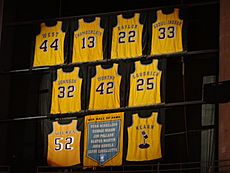
Kobe Bryant holds most individual team records for how long he played, including most games (1,333) and most minutes (48,298). Magic Johnson holds all major assist records for the club, including career assists (10,141) and assists in a game (24). Johnson also has the most triple-doubles (138). Elmore Smith holds team records for blocks in a game (17). Scoring records are mostly held by Elgin Baylor and Bryant. Baylor has the highest career scoring average (27.4), while Bryant has the most points in a single game (81).
The Lakers hold several NBA records as a team. This includes the most consecutive games won overall (33) and most consecutive road games won (16), both from the 1971–72 season. They also have the highest field-goal percentage for a season (54.5% in 1984–85). As of the 2009–10 season, they had the most wins (3,027), the highest winning percentage (61.9%), and the most NBA Finals appearances (31). The 2000–01 team set an NBA record for the best playoff record at 15–1, which was later broken by the Golden State Warriors in 2017. The 1971–72 team holds franchise records for wins (69) and largest margin of victory (63 points).
Home Arenas
The Lakers play their home games at Crypto.com Arena in downtown Los Angeles. The arena opened in 1999 and can hold up to 18,997 fans for Lakers games. The team's lease for the arena runs until 2041.
Before moving to Crypto.com Arena, the Lakers played their home games for 32 seasons (1967–1999) at The Forum in Inglewood, California. In their first seven years in Los Angeles, the team played at the Los Angeles Memorial Sports Arena. When the team was in Minneapolis, they played at the Minneapolis Auditorium and the Minneapolis Armory.
Team Personnel
Current Roster
Draft Rights Held
The Lakers hold the rights to certain players drafted who are playing outside the NBA. This means if these players decide to play in the NBA, they must sign with the Lakers.
| Draft | Round | Pick | Player | Pos. | Nationality | Current team | Note(s) | Ref |
|---|---|---|---|---|---|---|---|---|
| 2014 | 2 | 57 | Louis Labeyrie | F/C | UNICS Kazan (Russia) | Acquired from the New York Knicks | ||
| 2009 | 2 | 59 | Chinemelu Elonu | F/C | Al Qadsia (Kuwait) |
Draft Picks
The Lakers have had three first overall picks in their history: Elgin Baylor (1958), Magic Johnson (1979), and James Worthy (1982). They have also had six lottery picks (top 14 picks).
Head Coaches
There have been 29 head coaches for the Lakers. John Kundla coached the team in Minneapolis and led them to their first five championships. Pat Riley is second in franchise history for both regular season and playoff wins as a coach. Phil Jackson broke Riley's regular-season wins record in 2009 and playoff wins record in 2010. Jackson, Riley, Kundla, and Bill Sharman are all in the Basketball Hall of Fame for their coaching. Several former Lakers players have also coached the team. Phil Jackson coached the team from 2005 to 2011. Mike Brown replaced him in 2011 but was fired in November 2012. Mike D'Antoni then became head coach but resigned in 2014. Byron Scott was hired in 2014 and fired in 2016. Former Lakers player Luke Walton became coach in 2016 and served until 2019. Frank Vogel was named his successor in May 2019. Vogel was fired after the 2021–22 season. Darvin Ham was named coach in June 2022 but was fired in May 2024. On June 24, 2024, former NBA player JJ Redick was hired as the 29th coach in team history.
Hall of Famers and Retired Numbers
The Lakers have 41 Hall of Famers who contributed to the organization. This includes 31 players, 5 head coaches, 1 assistant coach, and 4 other contributors.
| Los Angeles Lakers Hall of Famers | |||||||||
|---|---|---|---|---|---|---|---|---|---|
| Players | |||||||||
| No. | Name | Position | Tenure | Inducted | No. | Name | Position | Tenure | Inducted |
| 99 | George Mikan 1 | C | 1948–1954 1955–1956 |
1959 | 22 34 |
Elgin Baylor | F | 1958–1971 | 1977 |
| 17 | Jim Pollard 2 | F | 1948–1955 | 1978 | 13 | Wilt Chamberlain | C | 1968–1973 | 1979 |
| 44 | Jerry West 3 5 | G | 1960–1974 | 1980 | 22 | Slater Martin | G | 1949–1956 | 1982 |
| 34 89 |
Clyde Lovellette | F/C | 1953–1957 | 1988 | 42 | Connie Hawkins | F/C | 1973–1975 | 1992 |
| 19 | Vern Mikkelsen | F | 1949–1959 | 1995 | 33 | Kareem Abdul-Jabbar | C | 1975–1989 | 1995 |
| 11 25 |
Gail Goodrich | G | 1965–1968 1970–1976 |
1996 | 11 | Bob McAdoo | F/C | 1981–1985 | 2000 |
| 32 | Magic Johnson 4 6 | G | 1979–1991 1996 |
2002 | 00 42 |
James Worthy | F | 1982–1994 | 2003 |
| 4 | Adrian Dantley | F | 1977–1979 | 2008 | 11 | Karl Malone 7 | F | 2003–2004 | 2010 |
| 73 | Dennis Rodman | F | 1999 | 2011 | 52 | Jamaal Wilkes | F | 1977–1985 | 2012 |
| 20 | Gary Payton | G | 2003–2004 | 2013 | 23 | Mitch Richmond | G | 2001–2002 | 2014 |
| 31 | Spencer Haywood | F | 1979–1980 | 2015 | 31 | Zelmo Beaty | C | 1974–1975 | 2016 |
| 34 | Shaquille O'Neal | C | 1996–2004 | 2016 | 11 | Charlie Scott | G | 1977–1978 | 2018 |
| 10 | Steve Nash | G | 2012–2015 | 2018 | 12 | Vlade Divac | C | 1989–1996 2004–2005 |
2019 |
| 8 24 |
Kobe Bryant | G | 1996–2016 | 2020 | 23 | Lou Hudson | G/F | 1977–1979 | 2022 |
| 16 | Pau Gasol | F/C | 2008–2014 | 2023 | 5 | Dick Barnett | G | 1962–1965 | 2024 |
| 21 | Michael Cooper | G | 1978–1990 | 2024 | |||||
| Coaches | |||||||||
| Name | Position | Tenure | Inducted | Name | Position | Tenure | Inducted | ||
| John Kundla | Head coach | 1948–1957 1958–1959 |
1995 | Bill Sharman | Head coach | 1971–1976 | 2004 | ||
| Phil Jackson | Head coach | 1999–2004 2005–2011 |
2007 | 12 | Pat Riley 8 | Assistant coach Head coach |
1979–1981 1981–1990 |
2008 | |
| Tex Winter | Assistant coach | 1999–2008 | 2011 | Rudy Tomjanovich | Head coach | 2004–2005 | 2020 | ||
| Contributors | |||||||||
| Name | Position | Tenure | Inducted | Name | Position | Tenure | Inducted | ||
| Pete Newell9 | General manager | 1972–1976 | 1979 | Chick Hearn | Broadcaster | 1961–2002 | 2003 | ||
| Jerry Buss | Owner | 1979–2013 | 2010 | Del Harris | Head coach | 1994–1999 | 2022 | ||
| Jerry West | General manager | 1982–2000 | 2024 | ||||||
Notes:
- 1 He also coached the team in 1957–1958.
- 2 He also coached the team in 1960.
- 3 He also coached the team in 1976–1979.
- 4 He also coached the team in 1994.
- 5 In total, West was inducted into the Hall of Fame twice—as player and as a member of the 1960 Olympic team.
- 6 In total, Johnson was inducted into the Hall of Fame twice—as player and as a member of the 1992 Olympic team.
- 7 In total, Malone was inducted into the Hall of Fame twice—as player and as a member of the 1992 Olympic team.
- 8 He also played for the team in 1970–1975.
- 9 In total, Newell was inducted into the Hall of Fame twice—as contributor and as a member of the 1960 Olympic team.
FIBA Hall of Famers
| Los Angeles Lakers Hall of Famers | ||||
|---|---|---|---|---|
| Players | ||||
| No. | Name | Position | Tenure | Inducted |
| 12 | Vlade Divac | C | 1989–1996 2004–2005 |
2010 |
| 34 | Shaquille O'Neal | C | 1996–2004 | 2017 |
| 10 | Steve Nash | G | 2012–2015 | 2020 |
Retired Numbers
The Lakers have retired 14 jersey numbers and an honorary microphone for their players and broadcaster.
| Los Angeles Lakers retired numbers | ||||
|---|---|---|---|---|
| No. | Player | Position | Tenure | Ceremony date |
| 8 | Kobe Bryant | G | 1996–2016 | December 18, 2017 |
| 13 | Wilt Chamberlain | C | 1968–1973 | November 9, 1983 |
| 16 | Pau Gasol | F | 2008–2014 | March 7, 2023 |
| 21 | Michael Cooper | G | 1978–1990 | January 13, 2025 |
| 22 | Elgin Baylor | F | 1958–1971 | November 9, 1983 |
| 24 | Kobe Bryant | G | 2006–2016 | December 18, 2017 |
| 25 | Gail Goodrich | G | 1965–1968 1970–1976 |
November 20, 1996 |
| 32 | Magic Johnson | G | 1979–1991 1996 |
February 16, 1992 |
| 33 | Kareem Abdul-Jabbar | C | 1975–1989 | March 20, 1990 |
| 34 | Shaquille O'Neal | C | 1996–2004 | April 2, 2013 |
| 42 | James Worthy | F | 1982–1994 | December 10, 1995 |
| 44 | Jerry West | G | 1960–1974 | November 19, 1983 |
| 52 | Jamaal Wilkes | F | 1977–1985 | December 28, 2012 |
| 99 | George Mikan | C | 1948–1954 1956 |
October 30, 2022 |
| Chick Hearn | Broadcaster | 1961–2002 | December 2, 2002 | |
- The NBA retired Bill Russell's No. 6 for all its member teams on August 11, 2022.
In addition, several other players and coaches from the Minneapolis Lakers era have banners honoring them as Hall of Fame members, even though their jersey numbers are not officially retired by the current team:
| Minneapolis Lakers honored numbers | ||||
|---|---|---|---|---|
| No. | Player | Position | Tenure | |
| 17 | Jim Pollard | F | 1948–1955 | |
| 19 | Vern Mikkelsen | F | 1949–1959 | |
| 22 | Slater Martin | G | 1949–1956 | |
| 34 | Clyde Lovellette | F/C | 1953–1957 | |
| John Kundla | Head coach | 1948–1957 1958–1959 |
||
Team Media and Broadcasts
For 41 years, Chick Hearn was the team's famous broadcaster until he passed away in 2002. He broadcast 3,338 games in a row. Hearn was known for giving Jerry West the nickname "Mr. Clutch."
After Hearn, Paul Sunderland became the main play-by-play announcer, with Stu Lantz as the color commentator. Later, Joel Meyers joined Lantz for TV broadcasts, and Spero Dedes and former Laker Mychal Thompson were on the radio.
For the 2011–12 season, Bill Macdonald became the new TV play-by-play announcer, joining Lantz. John Ireland joined Mychal Thompson on the radio.
Since the 2009–10 season, Lakers radio games have been heard on KSPN (ESPN Radio) in English and KWKW in Spanish.
In 2011, Time Warner Cable and the Lakers announced two new sports networks (one in English, one in Spanish) that would show the team's games exclusively for 20 years starting in the 2012–13 season. These networks are now known as Spectrum SportsNet.
See also
 In Spanish: Los Angeles Lakers para niños
In Spanish: Los Angeles Lakers para niños
 | Valerie Thomas |
 | Frederick McKinley Jones |
 | George Edward Alcorn Jr. |
 | Thomas Mensah |


